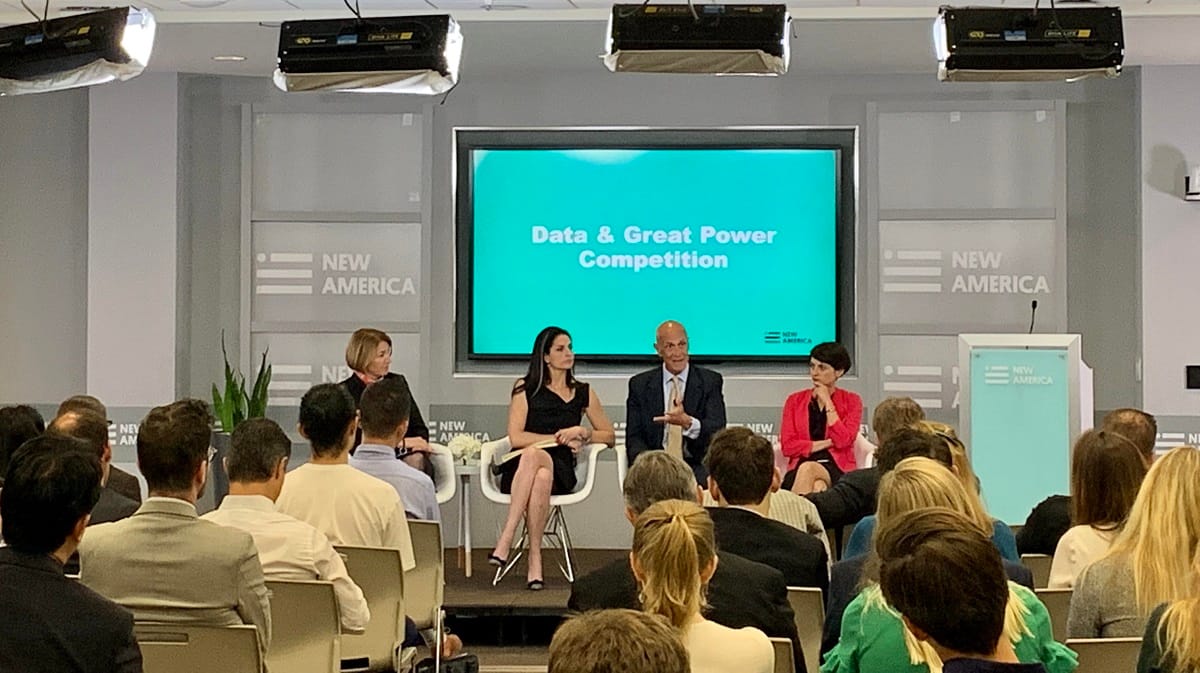America Needs to Be More Like Europe and Regulate Information Technology, New America Panelists Agree
WASHINGTON, June 4, 2019 – The United States government needs to regulate data and information technology more like those of European member states, said Europeans and Americans speaking at a New America Foundation event on Tuesday. “It’s clear that technology is front and center in a conflict that

WASHINGTON, June 4, 2019 – The United States government needs to regulate data and information technology more like those of European member states, said Europeans and Americans speaking at a New America Foundation event on Tuesday.
“It’s clear that technology is front and center in a conflict that could define the years to come,” said New America Cybersecurity Policy & China Digital Economy Fellow Samm Sacks at the kickoff of the think tank’s new project on “Data & Great Power Competition.”
“Less understood is the role that data governance will play in defining this relationship,” she said in reference to the need for a larger governmental rule in technology.
Sacks highlighted the need for a greater understanding of rules about how data is harnessed, who can access it, and how it can be used and shared. Looking at the coming “explosion of data,” she said, this will only become more important.
Marietje Schaake, who recently stepped down from the European Parliament, said in a prerecorded video that the western world has “failed to develop an agenda for the global governance of technology,” calling this a “crucial” step going forward.
Schaake claimed that the United States’ lack of rules promoting the principles of open internet and privacy have left the space for countries like China and Russia to instead craft the dominant paradigms for global governance.
Both inaction and policies founded on untested assumptions will have “significant consequences,” she said.
The rise of the internet has been largely surrounded by the belief that rules will stifle innovation, leading to a libertarian hands-off approach in both Silicon Valley and Washington. Schaake claimed, however, that without a certain amount of regulation, technology platforms would never have been able to grow as fast as they have.
At the event, Sacks identified three different values commonly framed as tradeoffs in the realm of data governance: Protection of personal liberties, data for innovation and competition in the private sector, and government access to data for national security purposes.
The two major players in technology right now are the United States and China, although these issues will play out all over the world. According to Sacks, China has a “split identity” when it comes to data privacy.
Over the past two years, the Chinese government has implemented many regulations for the use and sharing of data, including third party frameworks, intent to collect, and other measures that appear similar to the privacy-focused General Data Protection Regulation.
Isabella Buscke of the Federation of German Consumer Organizations said that the European commission is “extremely proud” that China has adopted regulations along the lines of GDPR, calling it the first step towards their goal of leading globally on privacy standards.
But the Chinese government is also able to access all of this data, which is especially troubling in light of the country’s authoritarian history. Chinese laws related to technology are usually written very broadly and ambiguously, allowing them to be selectively enforced.
Sacks warned that the United States should not make the same mistakes as China in terms of a sweeping definition of national security, citing last month’s executive order allowing the government to ban the purchase of any technology it decides poses a national security risk – and which it used to immediately target Chinese telecommunications manufacturer Huawei.
On the issue of national security, former U.S. Secretary of Homeland Security Michael Chertoff said that working in the Department of Justice during the September 11 attacks taught him the importance of data to assessing potential threats.
For example, with appropriate safeguards in place, the massive amounts of data being generated on a daily basis could help identify potential domestic terrorists, he said.
Some of the panelists discussed the importance of individual consent in determining whether and how their data is used. Certain websites inform visitors that their data is being collected, but require them to consent before allowing them access to the site. Chertoff said that this is not a real choice for the consumer.
Instead, he said, Americans need to shift the way in which they think about privacy. Although many people think about privacy in terms of keeping their data hidden, the focus should actually be on controlling data after it has been generated.
(Photo of the event at the New America Foundation by Emily McPhie.)








